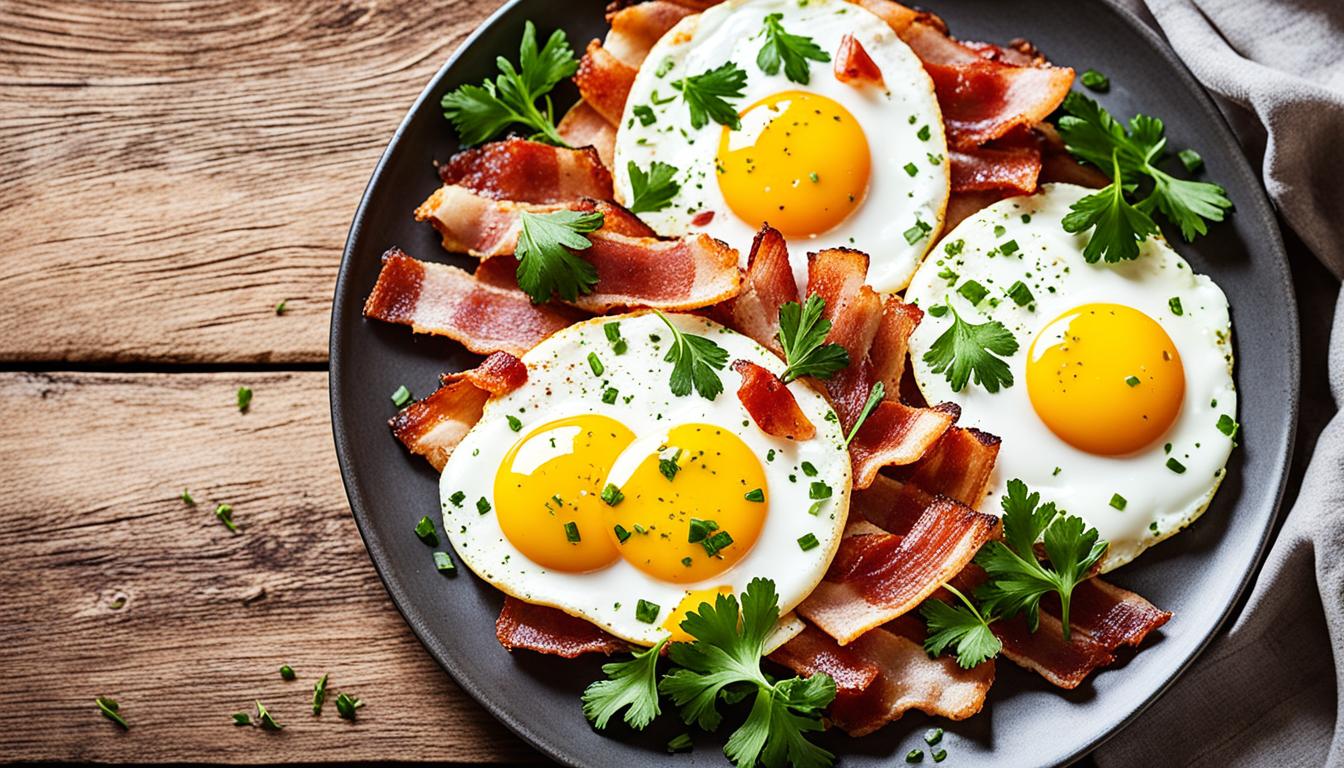Transform your body by following a low carb diet that switches your body’s main energy source from carbohydrates to fats, which can help with weight loss. By keeping your daily carb intake between 20-50 grams, you can achieve ketosis and start burning fat more quickly. Make sure to focus on consuming high-quality fats such as avocados and olive oil, and avoid grains and sugary snacks. Meal planning is crucial for success as it helps you stay disciplined and creative with your meals. Along the way, you’ll learn helpful tips to overcome challenges and effectively track your progress. Stay tuned for more secrets to help you reach your goals!
Key Takeaways
- A low carb diet promotes rapid weight loss by shifting energy sources from carbohydrates to fats, inducing ketosis for effective fat burning.
- Incorporating healthy fats, such as avocados and olive oil, comprises 70-75% of daily calories, enhancing weight loss and overall health.
- Meal planning is crucial; limit carbohydrate intake to 20-50 grams per day while focusing on high-fat and moderate-protein foods.
- Track progress by monitoring daily carb intake and ketone levels, aiming for a steady weight loss of 1-2 pounds per week.
Understanding Low Carb Diets

Understanding low carb diets means recognizing how they alter your body's energy source from carbs to fats, promoting weight loss and metabolic changes.
In a low carb diet, you typically restrict carbohydrate intake to about 20-50 grams per day, inducing a metabolic state called ketogenesis. This process encourages your body to burn fat for fuel instead of glucose, leading to significant changes in how you utilize energy.
A high fat diet, comprising approximately 70-75% of your total caloric intake, is vital to this approach. When you adopt meal plans rich in healthy fats, like avocados and olive oil, and moderate protein sources such as meats and fish, you create a favorable environment for fat burning.
Low-carb vegetables become your go-to options, while grains, sweets, and starchy foods are minimized.
It's important to note that initial weight loss may be rapid, often due to water weight, before shifting to fat loss as your body adapts to ketosis.
Keep in mind that the effectiveness of low carb diets can vary among individuals, so careful planning is essential to maintain balanced nutrition and avoid potential deficiencies.
Benefits of Low Carb Eating

When you adopt a low carb diet, you'll likely notice rapid weight loss as your body shifts into fat-burning mode.
Plus, many people report improved mental clarity, thanks to the efficient energy source provided by ketones.
These benefits can make sticking to your dietary goals much easier.
Weight Loss Acceleration
Low carb eating accelerates weight loss by shifting your body into ketosis, where it burns fat for fuel instead of relying on carbohydrates. When you follow a low-carb diet, typically limiting your intake to 20-50 grams per day, you enter this metabolic state, promoting rapid weight loss. Many people experience an initial drop of 3-10 pounds in the first week, largely due to water weight loss and reduced glycogen stores.
Research shows that a keto approach leads to greater reductions in body fat and waist circumference compared to traditional low-fat diets. Plus, improved insulin sensitivity and better blood sugar control can further enhance your weight loss journey. By incorporating healthy fats and moderate protein, you'll likely find it easier to curb hunger and manage your overall caloric intake.
Another benefit of this low-carb strategy is its ability to enhance fat oxidation and metabolic flexibility. Your body becomes more efficient at switching between burning carbs and fats, contributing to sustained weight loss over time.
Embracing a low-carb diet can help you achieve your weight loss goals while transforming your body effectively.
Improved Mental Clarity
Eating a low-carb diet can considerably enhance your mental clarity by providing your brain with a stable source of energy through ketones. When you switch to low carb eating, your body starts producing ketones, which serve as an efficient fuel for your brain. This shift often leads to improved cognitive function, allowing you to think more clearly and stay focused throughout the day.
Many people report a significant reduction in brain fog after adopting a ketogenic diet, experiencing sharper mental clarity and heightened energy levels. The reduction in insulin levels associated with low carbohydrate intake may also stabilize your mood, reducing the risk of mood swings and contributing to better overall mental health.
Furthermore, the neuroprotective effects of ketogenic diets may offer benefits for those facing cognitive decline or neurodegenerative diseases, such as Alzheimer's. As your body adapts to burning fat for fuel instead of carbohydrates, you might notice a remarkable increase in your energy levels and mental sharpness.
Embracing low carb eating could be the key to releasing your full mental potential.
Meal Planning for Success

Effective meal planning is vital for successfully managing a low-carb diet and staying on track with your goals. Start by creating a weekly menu that limits your carbohydrate intake to 20-50 grams per day. Focus on high-fat and moderate-protein foods to maintain ketosis. To guarantee you meet your macronutrient goals, consider using a keto calculator; typically, your diet should consist of 70-75% fats, 15-20% protein, and 5-10% carbohydrates.
Prepare a shopping list filled with keto-approved foods like avocados, nuts, low-carb vegetables, and high-quality meats. This not only streamlines your grocery trips but also enhances your meal prep efficiency. Batch cooking meals and snacks in advance can be a game changer. By preparing your food ahead of time, you'll manage cravings more effectively and maintain dietary discipline, making it easier to resist high-carb temptations during busy days.
Incorporating variety in your meal planning is essential. Experiment with different cooking methods or flavoring techniques to keep your meals exciting and enjoyable. This approach will help you stick to your low-carb diet for the long haul.
Foods to Include and Avoid

When you're following a low carb diet, knowing what to include and avoid is essential for success.
You'll want to emphasize healthy fats and quality protein while steering clear of high-carb foods that can derail your progress.
Let's break down the best choices for your meals.
Healthy Fats Choices
Incorporating healthy fats into your low-carb diet can enhance your overall health and support your body's energy needs. Focus on high-quality sources like avocados, olive oil, nuts, and fatty fish, such as salmon and mackerel.
These foods are rich in essential omega-3 fatty acids, which promote heart health and provide the necessary fuel for maintaining energy stability. Aim for your fat intake to comprise 70-75% of your total daily calories to effectively promote ketosis in a ketogenic diet.
While including these beneficial fats, be mindful to avoid unhealthy options. Steer clear of trans fats often found in processed snacks and baked goods, as well as unhealthy saturated fats from margarine and fatty cuts of red meat. These can negatively impact your cholesterol levels and overall well-being.
Incorporating full-fat dairy, such as cheese and heavy cream, can enhance flavor while keeping carb content low, making them suitable for your ketogenic diet.
Protein Sources to Include
High-quality protein sources are essential in a low-carb diet, providing the building blocks your body needs for muscle maintenance and overall health. Focus on incorporating grass-fed beef, free-range poultry, fatty fish like salmon and sardines, and eggs. These options not only support muscle growth but also fit perfectly within the ketogenic framework.
Dairy products such as full-fat cheese, Greek yogurt, and cream are excellent choices, as they offer protein along with healthy fats. Don't forget about nuts and seeds—almonds, walnuts, and chia seeds pack a protein punch and healthy fats, but watch your portion sizes since they're calorie-dense.
If you're leaning towards plant-based protein, consider tofu and tempeh. These options are great for a vegetarian or vegan ketogenic diet when paired with low-carb vegetables to maintain a balanced macronutrient profile.
Avoid high-carb protein sources like breaded meats, processed meats such as hot dogs, and legumes, including beans and lentils, as they can hinder ketosis by increasing your carbohydrate intake. Prioritize these protein sources to fuel your low-carb diet effectively!
Carbs to Avoid
To successfully maintain a low-carb diet, it's important to recognize which carbohydrates to avoid in order to stay within your daily limits and support fat burning.
Begin by eliminating high-carb foods like bread, pasta, rice, and sugary snacks. These items can easily derail your progress and hinder weight loss. Instead, focus on incorporating low-carb vegetables, such as leafy greens, broccoli, and zucchini, which are nutrient-dense and low in calories.
Processed foods are another culprit to avoid. They often contain hidden sugars and unhealthy ingredients that spike blood sugar levels, making it harder to maintain ketosis. Stick to whole, unprocessed foods as much as possible.
While fruits can be healthy, limit your intake to berries, as they have lower carb counts compared to other fruits.
Lastly, prioritize high-quality fats in your diet, like avocados, olive oil, and nuts, which should make up a significant portion of your caloric intake. This balanced approach will help you stay on track with your low-carb lifestyle and support your overall health and weight loss goals.
Common Challenges and Solutions

Steering through the common challenges of a low carb diet can feel overwhelming, but understanding effective solutions makes the journey easier.
One of the first hurdles you might face is the keto flu, which can bring fatigue and irritability as your body adjusts. Staying hydrated and replenishing electrolytes can greatly ease these symptoms.
Another challenge is meal monotony, which can make your diet feel boring. To combat this, plan diverse meals featuring high-fat foods like avocados, nuts, and low-carb veggies, keeping your meals interesting and enjoyable.
Tracking your macronutrient intake is vital for maintaining ketosis, so consider using a keto calculator to set personalized goals for carbs, fats, and protein. This helps you stay on track and makes your diet more effective.
Social situations can also be tricky due to dietary restrictions. Preparing keto-friendly snacks or researching restaurant menus in advance can help you navigate these outings without feeling deprived.
Monitoring Your Progress
Monitoring your progress is vital for guaranteeing you're staying on track with your low carb diet and achieving your health goals. Start by tracking your daily carbohydrate intake, aiming to stay within the recommended 20-50 grams to maintain ketosis effectively. This will help you optimize your body's fat-burning capabilities.
Weigh yourself weekly to assess your weight loss, targeting a safe rate of 1-2 pounds per week. It's also beneficial to utilize a food diary or mobile app to log your meals and macronutrient breakdown. This accountability can guide your dietary adjustments when necessary.
Regularly check your ketone levels using urine strips, breath analyzers, or blood ketone meters. This confirms you're in ketosis, which is essential for maximizing fat loss.
Additionally, pay attention to how you feel physically and mentally. Increased energy levels and reduced cravings are good signs that your dietary adjustments are working.
Long-Term Lifestyle Changes

Making lasting changes to your lifestyle is key to successfully maintaining a low-carb diet and enjoying its benefits over time. To achieve long-term weight loss, you'll need to focus on consistent meal planning and preparation. This helps guarantee you're meeting your macronutrient goals while avoiding high-carb foods that can derail your progress.
As you adapt to a low-carb diet, consider gradually reintroducing carbohydrates. This approach allows you to maintain your weight loss while enjoying a wider variety of foods without feeling deprived. Remember, the journey isn't just about shedding pounds; it's about improving your overall health, including enhancing your insulin sensitivity and glycemic control.
Engaging in community support can also be a game-changer. Join online forums or connect with friends on similar dietary journeys to boost your motivation and accountability. These connections can help you stay committed to your long-term lifestyle changes and keep you on track.
Frequently Asked Questions
How Long Does It Take for Your Body to Adjust to a Low-Carb Diet?
It usually takes your body about 2 to 4 days to enter ketosis on a low-carb diet. Initially, you might experience keto flu symptoms, but after a week, many notice increased energy and mental clarity.
What Happens if I Eat No Carbs for 2 Weeks?
Imagine shedding pounds as your body shifts gears, burning fat instead of carbs. After two weeks without carbs, you might feel drained initially, but soon, clarity and energy can blossom, transforming your daily routine.
What Are the Results of the 12 Week Low-Carb Diet?
In 12 weeks on a low-carb diet, you can lose 10-15 pounds, improve body composition, boost energy levels, reduce cravings, enhance insulin sensitivity, and feel less hungry, making it easier to achieve your health goals.
How Much Weight Can You Lose in 3 Months on Keto?
You can lose between 12 to 24 pounds in three months on a ketogenic diet, depending on your adherence and metabolism. Initial losses often include water weight, but sustained results are achievable with consistency.
What are the Benefits of a Low Carb Diet Compared to the Atkins Carbohydrate Counter?
The benefits of a low carb diet compared to the Atkins carbohydrate counter for healthy eating are numerous. A low carb diet can help with weight loss, improve blood sugar control, and reduce the risk of certain chronic diseases. Additionally, it can lead to increased energy and improved mental clarity.
Conclusion
Incorporating a low carb diet can truly transform your body and boost your overall health.
Just look at Sarah, who shed 30 pounds in three months by swapping out sugary snacks for veggies and healthy fats.
By sticking to her meal plan and facing challenges head-on, she not only reached her weight goal but also gained a newfound confidence.
Remember, it's about making sustainable changes that work for you, so embrace the journey and enjoy the results!










